A few random things I haven't bothered to share yet...
Restaurants When you go to an American restaurant, be it a nice French place or Denny's, there is a certain protocol that is followed. Someone shows you to a seat. You get a menu. Drink are brought. Order is taken. And food is delivered. There's also a certain ambience, from romantic to goofy shit all over the wall.
Not so in most Chinese restaurants. Unless you go to a fancy schmancy place (or one run by foreigners), you'd better lower your expectations. Chinese restaurants are typically brightly lit establishments, their walls barren, save for the ocassionaly beer poster. The kitchen is often right in the dining area, perhaps right by the door, so passersby can see what's being served up. Usually the menu's on the wall. Or there's no menu, so if you can't speak Chinese, you just take a look at their ingredients and tell the cook what you want. Dishes are served when they're ready. Tables almost always have three things on them: A container of chopsticks (if they're reusable, just hope they've been cleaned); a variety of condiments (soy sauce, vineagar, chilies, salt); and toilet roll or tissues (there's no napkins). Throw dirty napkins, fatty meat and bones on the floor. Hell spit on the floor or do a snot rocket if you like.
It's a very different experience.
Babies Chinese love babies and young children. One train ride sums it up pretty well. A boy, no more than 1 1/2 or so, was sitting near me. Everyone who passed touched him in some way: rubbed his cheeks, smacked his butt or held him. Complete strangers.
And babies in China do without quite a lot. 1--There are virtually no strollers/prams. Kids are carried on their parents' backs usually or even the littlest children walk. 2--I haven't seen a single pacifier yet. And lastly: 3--Diapers. The littlest babies might have them. We're talking less than six months (though usually quite younger). Little kids just have big holes in the crotch/butt of their pants. Potty training starts really early in China. Parents get their kids to go to the bathroom at certain times--often just on the street. You see little kids copping a squat on the sidewalk all the time. I have not seen one person get peed on from a diaper-less kid yet.
Annoyances Despite their kindness and great sense of hospitality, the Chinese can be horribly annoying. I give you the following reasons:
--Spitting. We're talking huge, throat-clearing loogies. They don't swallow saliva. They spit all over the street, out bus windows, on bus floors, in restaurants, internet cafes, etc. And they also blow their nose on their fingers, then wipe it off and make snot rockets. Yum. And they women are just as guilty--no lie.
--Noise. Christ. Sometimes I want to yell. But it would have to be quite loudly. They talk on their cell phones like they're trying to yell at the person sans phone. They use their cell phones as ghetto blasters in every sort of public space. They play TVs and radios way too loudly. And they make all sorts of godawful noise while they're eating. China's a noisy place.
--Smoking. Everywhere. The dude at the computer next to me is smoking now. On buses, in restaurants, on trains. But they do often offer me a cigarette, so I guess that's half a point back to them
Despite these irritations, as I've said before, the Chinese people are incredibly generous and good-natured people. And therefor I give you...
Chinese hospitality In no particular order, a list of things Chinese people have done for me during my stay:
-A police officer pulled over a cab for me when I was having trouble hailing one in Qingdao
-A woman paid for my bus ticket just the other day
-When I stayed at the Tibetan village, I paid $15 for a stay that could easily have been worth three times that
-Countless offerings of food and cigarettes (again, only half a point)
-A young Chinese guy on a train, who spoke very little English, declared us friends and gave me a kite
-Sim gave me a free ride and a few free meals
-Workers shared their yak-butter tea with me during their break
-Walking back to town from a village today (about 5 miles...it was downhill and great weather), several people stopped to offer me a ride, including a government car of some sort
That's it for now. As you can see, there's a lot more to my trip than pretty pictures and scary bus rides.
Wednesday, October 29, 2008
Tuesday, October 28, 2008
And back into the boonies
I'm in the middle of nowhere again. I've gone to the southeast portion of the Guizhou province, making my way toward Guangxi province and the backpacker town of Yangshuo. Last night, I stayed in a Miao (Hmong) village in a beautiful valley. While it's got a very touristy vibe to it, Xijiang is not the Disneyland of Lijiang, but a real village. Wooden houses are built into the hillside and the roads are stone. The people are incredibly friendly and hospitable. The woman sitting next to me on the bus today even paid for my ($1.20) ticket, despite my resistance.
Tonight I'm in a more developed town called Rongjiang. Tomorrow it's on to Conjiang (notice a pattern here?), where I'll venture down the road to Basha, which is supposed to be another nice village. After that, I'll make one or two more stops in this province before heading into Guangxi. About three more weeks in China, and plenty yet to see!
Hong Kong is next, where I'll spend a few days with Paul's dad, who's a teacher at the international school. There's been a bit of a change to the itinerary after Hong Kong, though, I'm afraid. I had been planning to go to Vietnam next, but that will have to wait til later, as something a bit more exciting is in the works. Where am I going instead? That's for me to know and you to find out. The only hint I'll give for now is that this place isn't among the countries I had initially intended to visit. That narrows it down by, oh, five. More on this later. And photos from these villages to come later as well!
Tonight I'm in a more developed town called Rongjiang. Tomorrow it's on to Conjiang (notice a pattern here?), where I'll venture down the road to Basha, which is supposed to be another nice village. After that, I'll make one or two more stops in this province before heading into Guangxi. About three more weeks in China, and plenty yet to see!
Hong Kong is next, where I'll spend a few days with Paul's dad, who's a teacher at the international school. There's been a bit of a change to the itinerary after Hong Kong, though, I'm afraid. I had been planning to go to Vietnam next, but that will have to wait til later, as something a bit more exciting is in the works. Where am I going instead? That's for me to know and you to find out. The only hint I'll give for now is that this place isn't among the countries I had initially intended to visit. That narrows it down by, oh, five. More on this later. And photos from these villages to come later as well!
Friday, October 24, 2008
Rain, rain, go away!
Thanks to a rainy day in Guiyang (Gway yahng), I'm providing you with your weekly vicarious living fix.
Where the hell is Guiyang you ask? Well, being the considerate guy I am, I've updated my map:
View Larger Map
Better? OK.
So, what have I been doing the last week that has prevented me from devoting my entire attention from entertaining you? I'm glad you asked. It began with a five-day stay in Kunming. There's not a lot to do there; but there is french toast and pizza. I had plenty of both. After shitloads of noodles, rice and unidentifiable meat, it was so nice to have some western food. But one can only sit on his ass and gorge himself for so long, so I packed up and headed south for the Yuanyang rice terraces.
And on the way, our driver decided to take out a truck.
And yes, I was sitting where I took the photo from. Fortunately we didn't hit something bigger, or I might have kissed the windshield. And thankfully the driver of the other vehicle got out alive. This delayed our trip by about 90 minutes while we waited for the police and insurance inspector to come. Now in the US, our driver would have been at fault--he was trying to pass the truck on the wrong side of the road. But the driver did obey the Chinese rule of honk-before-you-pass, and he's got the bigger vehicle, so I think in crazy backwards Commy-land, the driver of the truck (who probably lost his whole livelihood with this wreck) is likely the one to blame.
Anyway, the unscheduled rest stop allowed me to meet some of the other folks on the bus, including Don (Australia) and Kristi (New Zealand), with whom I shared a room and explored the area with.
Home base for exploring the rice terraces is Xinjie, also called Yuanyang. It's a nice town, perched far up in the moutains--about 1,500 meters up.
We scheduled a van for the next day to take us out to see the sunrise and sunset, and some villages on the way; there are specific sites that are best for each occasion. As it was raining when we got arrived, we didn't know whether the weather would cooperate, but realized that regardless, we'd probably be fighting fog at the least.
Weather 1, us 0.
The climate allows them only to plant once a year, so during the winter months, they just let the paddies flood...so during a nice sunrise or sunset, the colors reflect off the water. Despite the lack of an actual sunrise, we were able to see some great scenes of the 1,000-year-old terraces (yes, that's a thousand years these have been in use). I'm sorry to say that the few decent photos I was able to capture don't do the beauty of area justice.
Sunset didn't work out too well either. This is all we got before everything was blanketed with fog.
But equally as exciting as the terraces were the people, many belonging to the Hani minority, who inhabited the area. We spent some time at a couple local markets and trekked a bit to some nearby villages.
Now don't get all "child abuse" on me. This guy isn't smoking dope. It's common in Yunnan for folks to smoke their tobacco with bongs. Even their cigarettes.
Water buffalo are the tractor of choice in the region.
Harvesting rice.
Paving a road. The women carried baskets of sand on their backs while the men mixed it with cement or sat on the ground smoking cigarettes. Chinese women are the hardest workers I've ever seen.
And who can resist taking a photo of a cute little girl in traditional clothing?
Even though mother nature had it in for us, we still had a great time. And I ruined my shoes.
Sooner or later... I knew I'd run into dog meat. Found it. We saw several shops in the area that specialized in dog meat. We even made a running joke that all the dogs we came across were named "dinner." Not so funny, though, was when Don and Kristi actually witnessed someone butchering a dog. Thankfully I missed that one, but apparently the knife wielder found it entirely unnecessary to do his task humanely and simply sliced the dog down the middle and let it bleed to death, barking and yelping all the while.
I will not be trying dog meat (and let's not get into whether I may have unknowingly).
Where the hell is Guiyang you ask? Well, being the considerate guy I am, I've updated my map:
View Larger Map
Better? OK.
So, what have I been doing the last week that has prevented me from devoting my entire attention from entertaining you? I'm glad you asked. It began with a five-day stay in Kunming. There's not a lot to do there; but there is french toast and pizza. I had plenty of both. After shitloads of noodles, rice and unidentifiable meat, it was so nice to have some western food. But one can only sit on his ass and gorge himself for so long, so I packed up and headed south for the Yuanyang rice terraces.
And on the way, our driver decided to take out a truck.
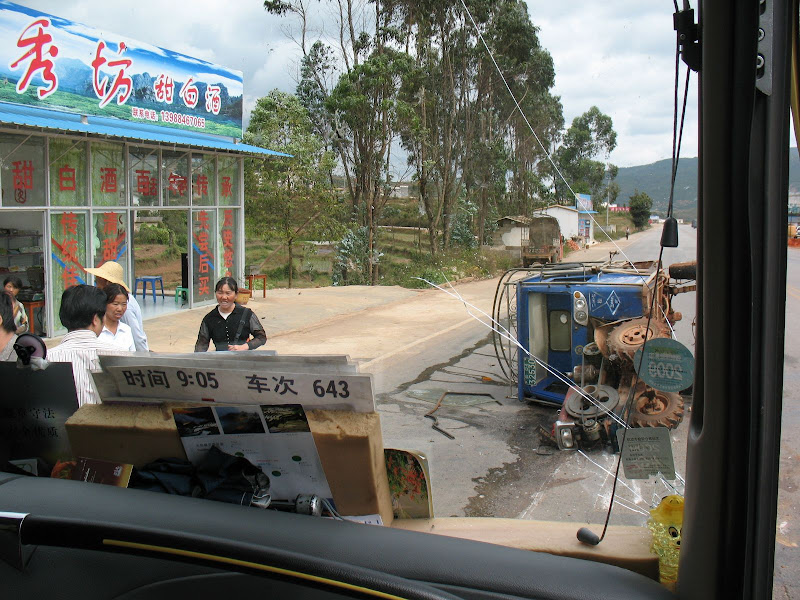 |
| From China |
And yes, I was sitting where I took the photo from. Fortunately we didn't hit something bigger, or I might have kissed the windshield. And thankfully the driver of the other vehicle got out alive. This delayed our trip by about 90 minutes while we waited for the police and insurance inspector to come. Now in the US, our driver would have been at fault--he was trying to pass the truck on the wrong side of the road. But the driver did obey the Chinese rule of honk-before-you-pass, and he's got the bigger vehicle, so I think in crazy backwards Commy-land, the driver of the truck (who probably lost his whole livelihood with this wreck) is likely the one to blame.
Anyway, the unscheduled rest stop allowed me to meet some of the other folks on the bus, including Don (Australia) and Kristi (New Zealand), with whom I shared a room and explored the area with.
Home base for exploring the rice terraces is Xinjie, also called Yuanyang. It's a nice town, perched far up in the moutains--about 1,500 meters up.
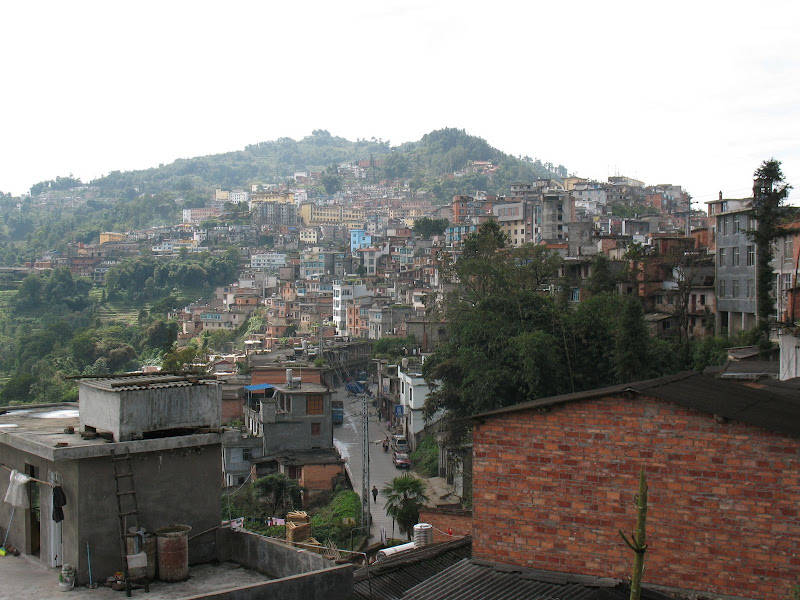 |
| From China |
We scheduled a van for the next day to take us out to see the sunrise and sunset, and some villages on the way; there are specific sites that are best for each occasion. As it was raining when we got arrived, we didn't know whether the weather would cooperate, but realized that regardless, we'd probably be fighting fog at the least.
Weather 1, us 0.
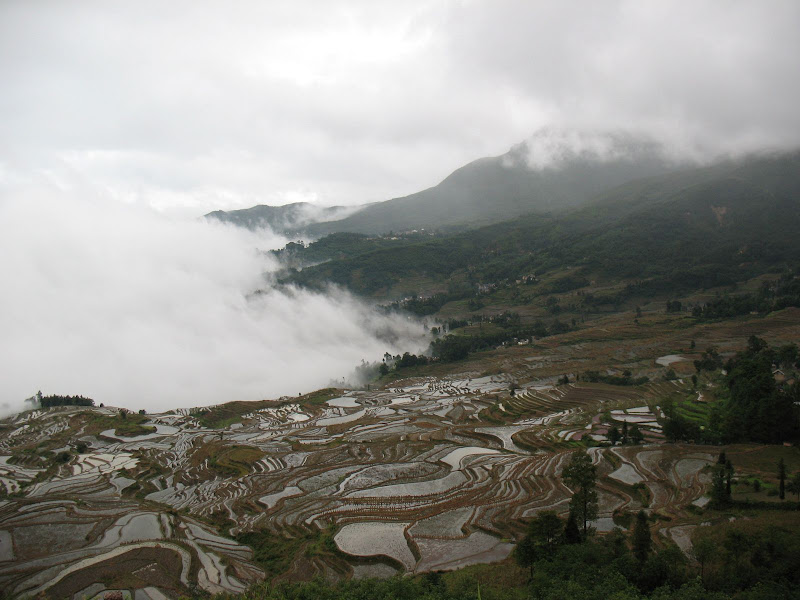 |
| From China |
The climate allows them only to plant once a year, so during the winter months, they just let the paddies flood...so during a nice sunrise or sunset, the colors reflect off the water. Despite the lack of an actual sunrise, we were able to see some great scenes of the 1,000-year-old terraces (yes, that's a thousand years these have been in use). I'm sorry to say that the few decent photos I was able to capture don't do the beauty of area justice.
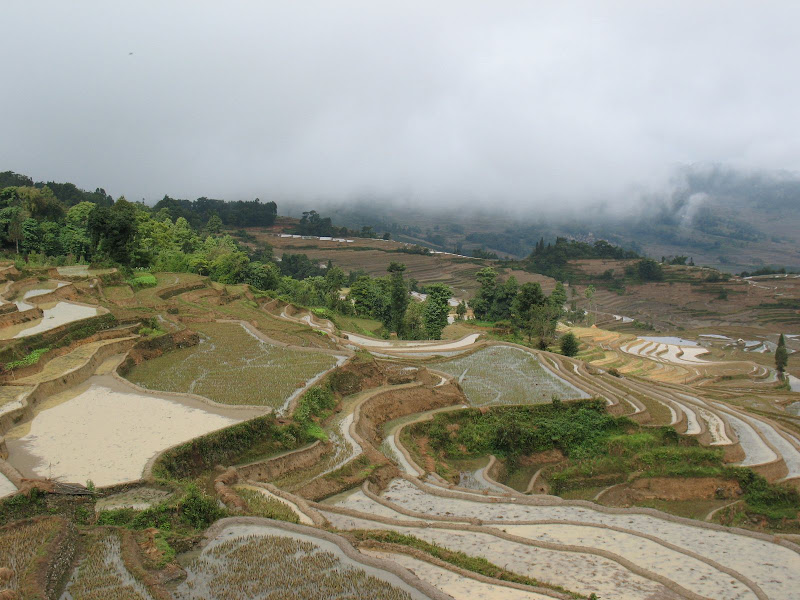 |
| From China |
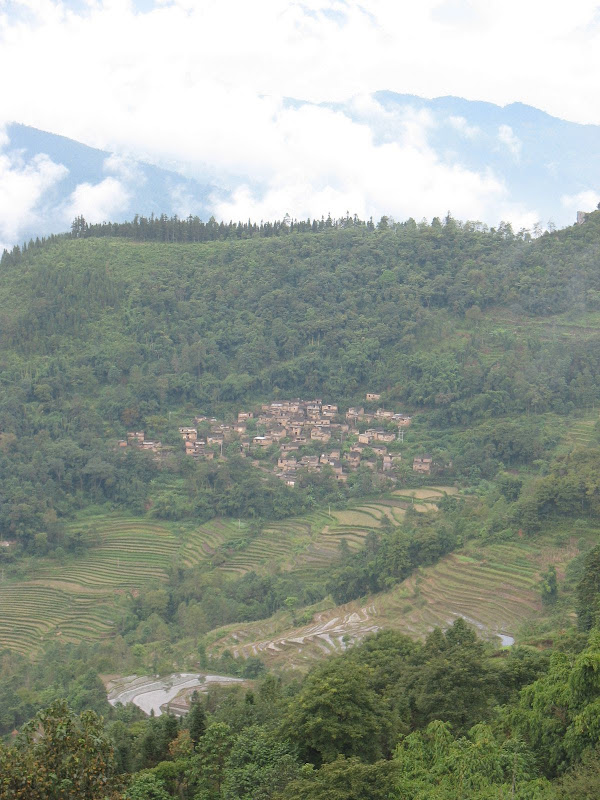 |
| From China |
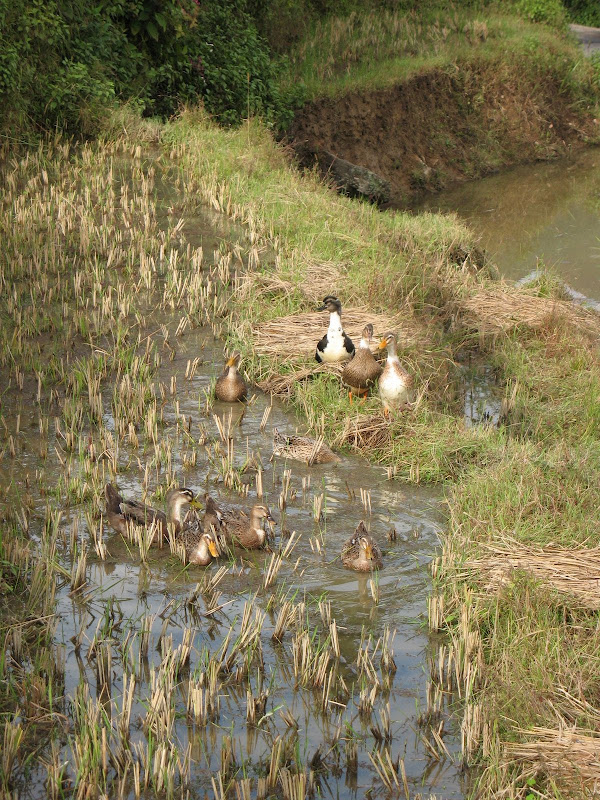 |
| From China |
Sunset didn't work out too well either. This is all we got before everything was blanketed with fog.
 |
| From China |
But equally as exciting as the terraces were the people, many belonging to the Hani minority, who inhabited the area. We spent some time at a couple local markets and trekked a bit to some nearby villages.
Now don't get all "child abuse" on me. This guy isn't smoking dope. It's common in Yunnan for folks to smoke their tobacco with bongs. Even their cigarettes.
 |
| From China |
Water buffalo are the tractor of choice in the region.
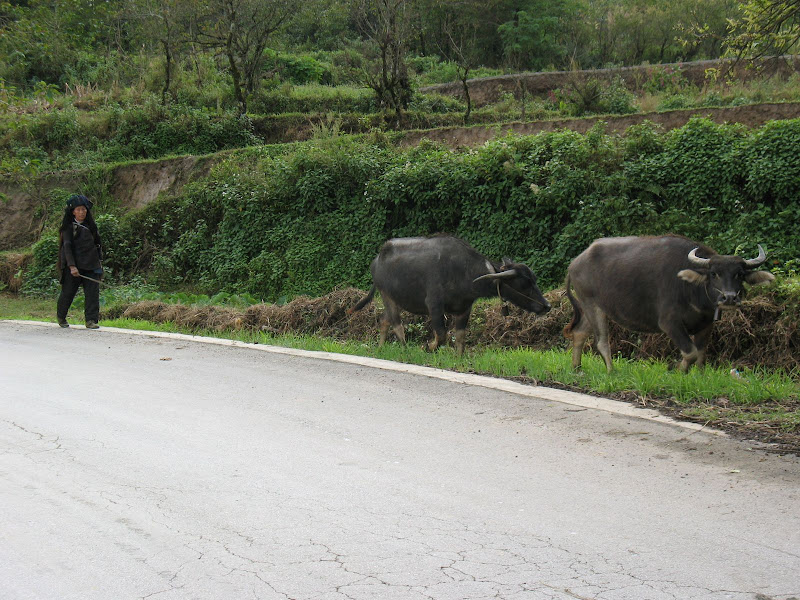 |
| From China |
Harvesting rice.
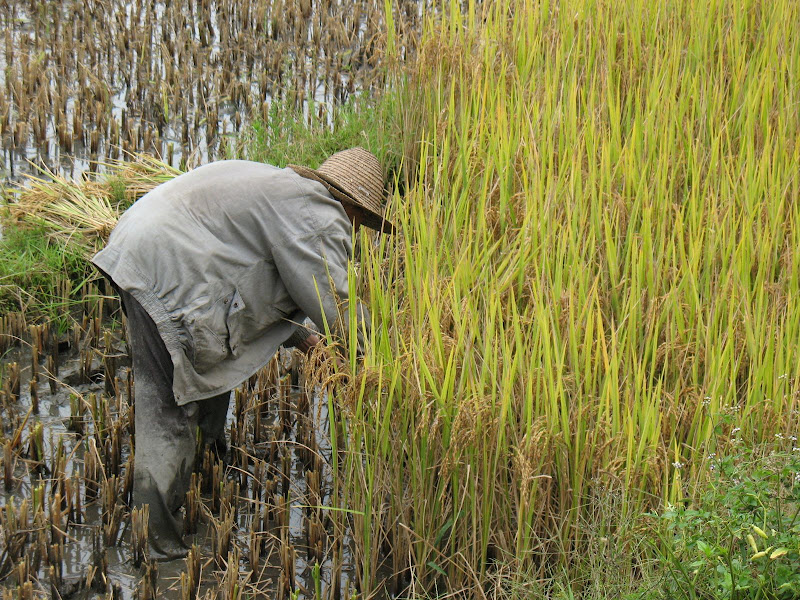 |
| From China |
Paving a road. The women carried baskets of sand on their backs while the men mixed it with cement or sat on the ground smoking cigarettes. Chinese women are the hardest workers I've ever seen.
 |
| From China |
And who can resist taking a photo of a cute little girl in traditional clothing?
 |
| From China |
Even though mother nature had it in for us, we still had a great time. And I ruined my shoes.
Sooner or later... I knew I'd run into dog meat. Found it. We saw several shops in the area that specialized in dog meat. We even made a running joke that all the dogs we came across were named "dinner." Not so funny, though, was when Don and Kristi actually witnessed someone butchering a dog. Thankfully I missed that one, but apparently the knife wielder found it entirely unnecessary to do his task humanely and simply sliced the dog down the middle and let it bleed to death, barking and yelping all the while.
I will not be trying dog meat (and let's not get into whether I may have unknowingly).
Thursday, October 16, 2008
Nu Jiang valley
I had heard that the Nu River valley in western Yunnan Province is a beautiful, untouristed area. It was part of a resupply obstacle called "The Hump" (due to the high mountain ranges) in World War II. I shared that information with some of my fellow travelers and Paresh from England and I decided to check it out for ourselves. We weren't disappointed.
The Nu river (Nu Jiang) starts in Tibet, flows through western Yunnan and enters Myanmar, where it is called the Salween. It is entirely undammed. It is powerful. The current makes the Misourri look like a kiddie pool (and, amazingly, we saw a group of young boys playing in the Nu). There are dozens of areas with strong rapids. The photo below only begins to show the river's power:
To follow the river in Yunnan, you must start in Liuku and work your way north. The river is surrounded by imposing mountains, which are dotted with small farms. Some of the fields were as much as 1,000 feet up the side of the steep mountains. I'm sure they don't go in to town regularly. We covered about 300 kilometers and walked the last 10, where we saw the best views of all. I'll just let the photos speak for themselves:
As you can see, some incredible scenery. And lastly, an interesting sign we came across. Basically it says, if you cut the power lines, we are going to beat the crap out of you. Ahh, communism.
And now I'm in Kunming, after taking my first-ever sleeper bus. A sleeper bus is three rows across of two beds high. The bed was just long enough to hold me and just wide enough for me to put my arms at my side. Not ideal sleeping conditions but it got me here. Kunming is just another million-plus city with lots of concrete. I plan to have some western food and perhaps enjoy a bit of nightlife. But in a couple days I will move on again--I just don't know to where.
The Nu river (Nu Jiang) starts in Tibet, flows through western Yunnan and enters Myanmar, where it is called the Salween. It is entirely undammed. It is powerful. The current makes the Misourri look like a kiddie pool (and, amazingly, we saw a group of young boys playing in the Nu). There are dozens of areas with strong rapids. The photo below only begins to show the river's power:
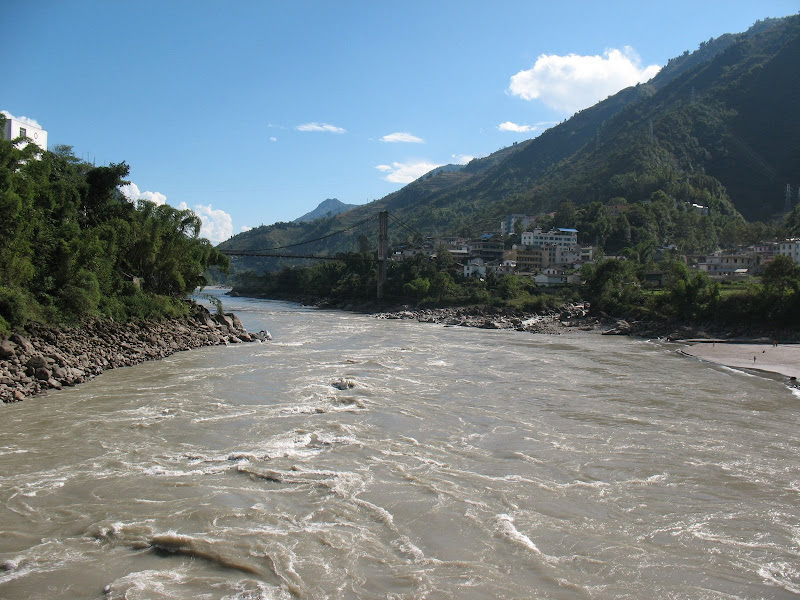 |
| From China |
To follow the river in Yunnan, you must start in Liuku and work your way north. The river is surrounded by imposing mountains, which are dotted with small farms. Some of the fields were as much as 1,000 feet up the side of the steep mountains. I'm sure they don't go in to town regularly. We covered about 300 kilometers and walked the last 10, where we saw the best views of all. I'll just let the photos speak for themselves:
 |
| From China |
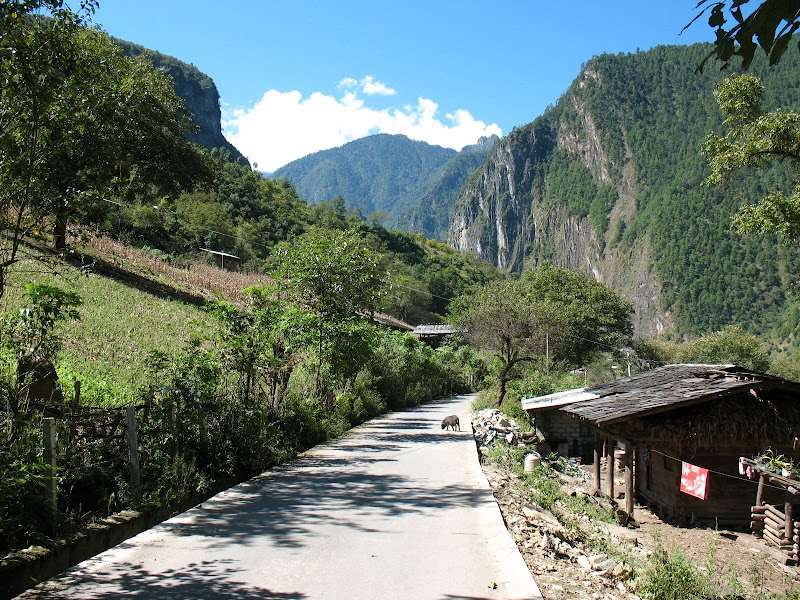 |
| From China |
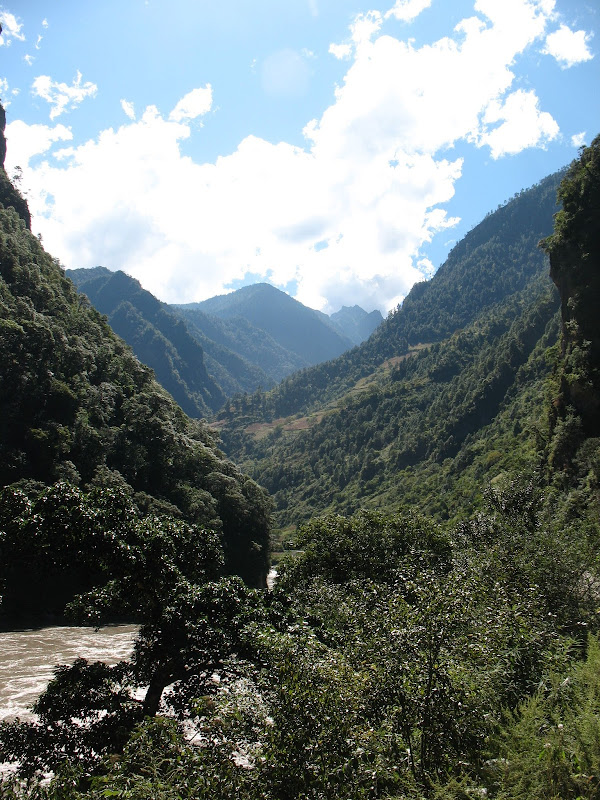 |
| From China |
 |
| From China |
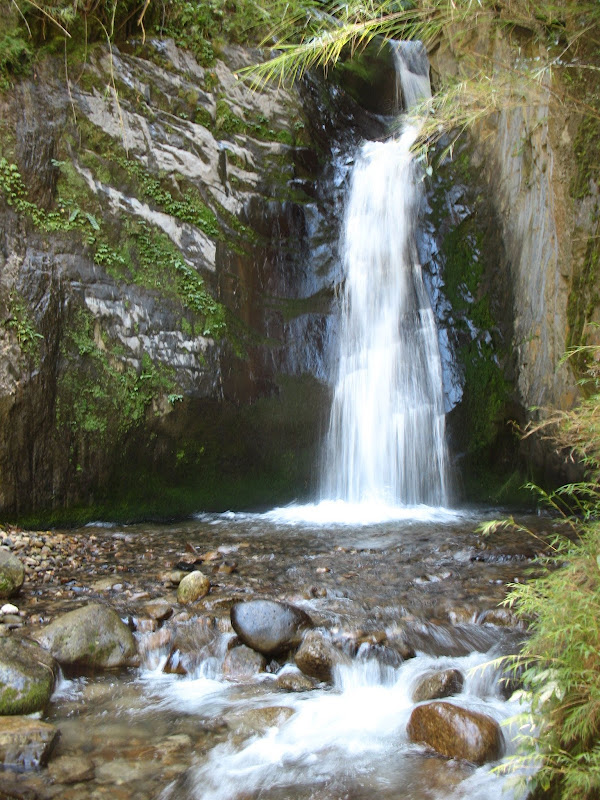 |
| From China |
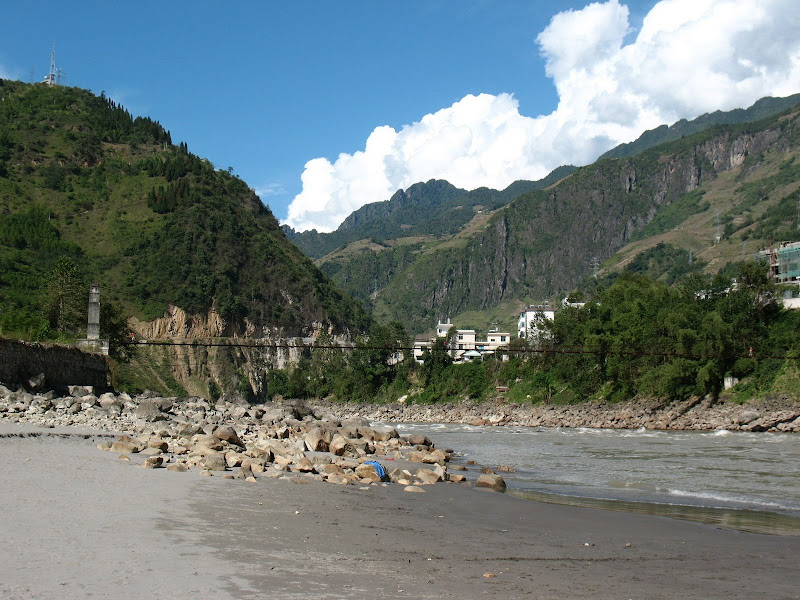 |
| From China |
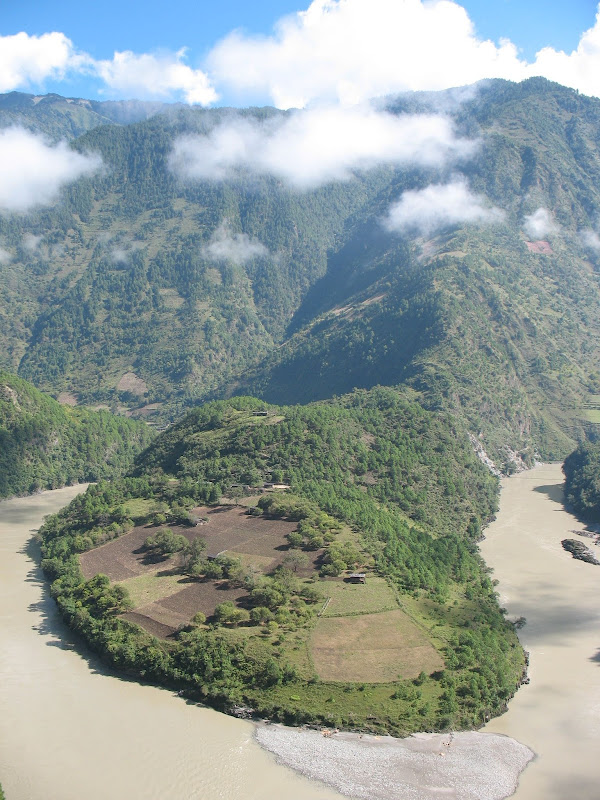 |
| From China |
As you can see, some incredible scenery. And lastly, an interesting sign we came across. Basically it says, if you cut the power lines, we are going to beat the crap out of you. Ahh, communism.
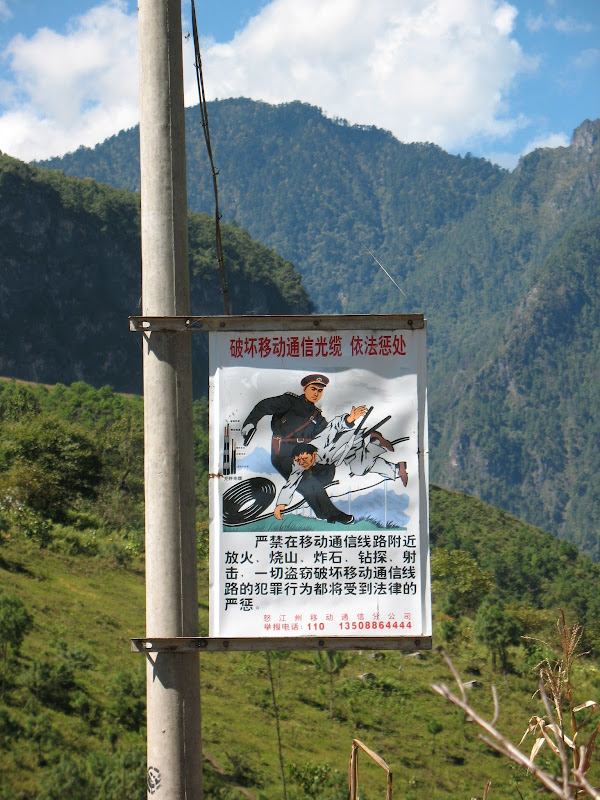 |
| From China |
And now I'm in Kunming, after taking my first-ever sleeper bus. A sleeper bus is three rows across of two beds high. The bed was just long enough to hold me and just wide enough for me to put my arms at my side. Not ideal sleeping conditions but it got me here. Kunming is just another million-plus city with lots of concrete. I plan to have some western food and perhaps enjoy a bit of nightlife. But in a couple days I will move on again--I just don't know to where.
Friday, October 10, 2008
Ganja?
Dali is a great town. There's a new city (that no one visits) and the old town, complete with city wall and gates. It's a backpacker haven. It also seems to be the stoner capital of China. And the drug dealers are everywhere. They're not who you'd imagine them to be, either. Ladies, often in the traditional clothing of the local people, sidle up alongside wandering foreigners and make known what they have to offer. "Ganja?" they'll whisper. "Hashish? You want to buy?"
To escape the skunky smell that seems to hover over the city, I rented a bike and went off around the nearby lake. We're talking a big lake. I pedaled for something like five hours the first day and covered more than 35 miles to the other side, where I spent the night in a small town. The next day, I wimped out and only went a few more miles before I took the ferry back to the other side. My ass and hands hurt from the less-than-perfect road conditions.
It's rice country, and it's harvest time, so I had a good glimpse at farm life in China. They cut the plant and then bash it into a basket to release the grains of rice, which is later spread on the ground to dry, often just on the road or highway.
Of course I snapped a few photos on my way around...
...some nice views there, if I do say so myself.
Lastly, I've updated my map to reflect my travels so far in China. Play around with it and check out where I've been.
View Larger Map
Today or tomorrow, I'm heading out to some less touristed parts. The Hu river in very western Yunnan runs from Tibet, through Yunnan along the Myanmar border and into Myanmar in the south. It's apparently quite a beautiful area. May be away from the Internet again for a few days (the agony!), but I'll have more up soon enough.
To escape the skunky smell that seems to hover over the city, I rented a bike and went off around the nearby lake. We're talking a big lake. I pedaled for something like five hours the first day and covered more than 35 miles to the other side, where I spent the night in a small town. The next day, I wimped out and only went a few more miles before I took the ferry back to the other side. My ass and hands hurt from the less-than-perfect road conditions.
It's rice country, and it's harvest time, so I had a good glimpse at farm life in China. They cut the plant and then bash it into a basket to release the grains of rice, which is later spread on the ground to dry, often just on the road or highway.
Of course I snapped a few photos on my way around...
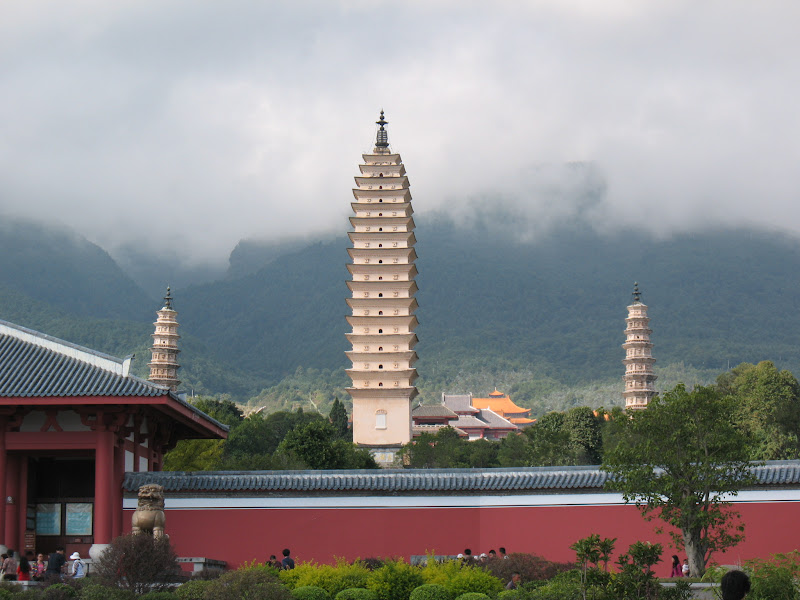 |
| From China |
 |
| From China |
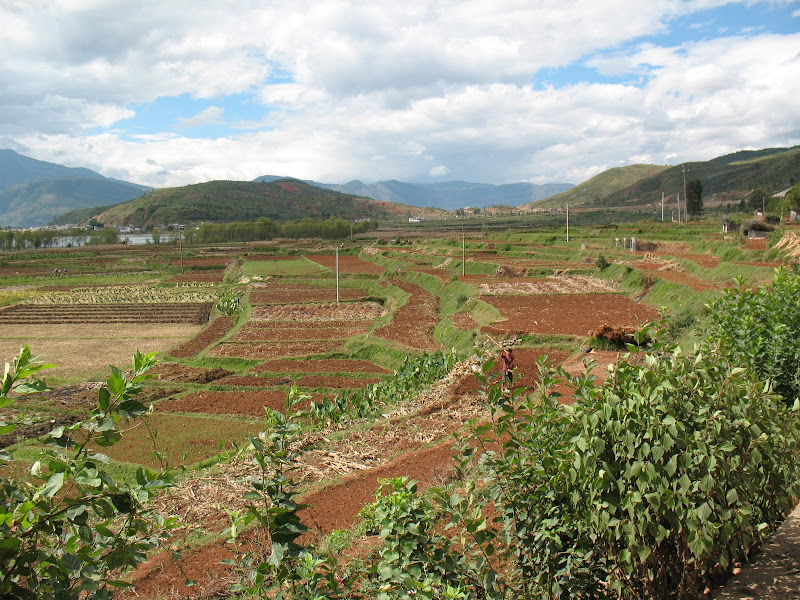 |
| From China |
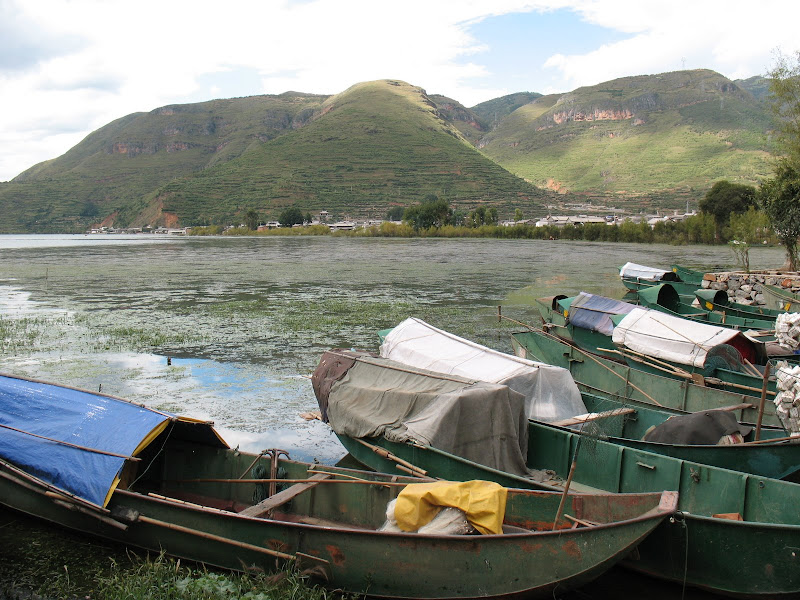 |
| From China |
 |
| From China |
 |
| From China |
...some nice views there, if I do say so myself.
Lastly, I've updated my map to reflect my travels so far in China. Play around with it and check out where I've been.
View Larger Map
Today or tomorrow, I'm heading out to some less touristed parts. The Hu river in very western Yunnan runs from Tibet, through Yunnan along the Myanmar border and into Myanmar in the south. It's apparently quite a beautiful area. May be away from the Internet again for a few days (the agony!), but I'll have more up soon enough.
Tuesday, October 07, 2008
The bare necessities
A quick update on my whereabouts。。。 I‘m in Dali, a pretty popular tourist/backpacker town in northwestern Yunnan Province。 Last post, Iwas in Shangri La, near the Sichuan border。 From there I went to Lijiang, which has an old town that’s been labeled a Unesco World Heritage site, but feels more like Disney Land。 Dali also has an old town, but it‘s home to more practical things, rather than street after street of souvenir stalls。I plan to spend a few days in the area,as there’s plenty to do。 Dali sits right next to a lake,and I intend to hire a bike and go around the lake over two or three days。 Some nice villages to stop at along the way。 After that, I‘m debating over a couple options。 More later。
And now for some basics, which I‘m sure you’ll be interested in。 At least my parents are every time Italk to them。
How/what do Ieat?
I haven‘t gone hungry yet。 And I’ve eaten remarkably little western food。 I‘ve had a cheeseburger twice and the odd order of fries at a hostel。 But typically, it’s Chinese all the way。I tend not to eat at hostels, as it is quite a bit more expensive than eating at a neighborhood restaurant。 I can say/read only a few food-related things in Chinese, so Ido tend to eat the same foods frequently。 I know how to order beef noodles, boiled dumplings and steamed buns like a pro, and I can read the symbols for those items。 Other times, I‘ll just point to something on the menu and hope it’s good。 Or if I‘m with a group of people, we can get several items to share, with rice。
It’s also fun to browse what street vendors have on offer and just ask for one of whatever they‘re serving up。 Usually quite tasty。 I‘ve had some amazing breads and fried dumplings。 My favorite dish so far was in Xian--Lamb soup with shredded bread, noodles and vegetables。 It felt like a bottomless meal。 Typically, I’ll spend about 30 to 60 cents for breakfast (usually some type of bread) and around 80 cents to 1。50 for lunch and dinner, unless I‘m slurging。 A homemade burger and fries today cost me three bucks。
How do I communicate?
People speak English in the weirdest of places。 I’ve found more people able (or willing) to speak it in smaller towns than in Beijing。 But it‘s not necessary。 Hand signals work wonders。 You can come up with a mime for nearly everything。 Also, the limited Chinese I know comes in handy nearly every day。 I‘m pretty proficient in numbers and know other important words like “today” and “tomorrow,” which are essential for arranging transportation。
So regardless of what you might have thought (or hoped for), I’m not entirely helpless here in China。 I‘m getting fed (good food) and I’m feeling quite unrestricted。
And since I know you’ve been so worried, Yes I‘m feeling quite a bit better。 I don’t know whether the herbal rememdy is to blame or time and warmer weather have done the trick。 Either way, fever is gone and just a bit of cough left。
And now for some basics, which I‘m sure you’ll be interested in。 At least my parents are every time Italk to them。
How/what do Ieat?
I haven‘t gone hungry yet。 And I’ve eaten remarkably little western food。 I‘ve had a cheeseburger twice and the odd order of fries at a hostel。 But typically, it’s Chinese all the way。I tend not to eat at hostels, as it is quite a bit more expensive than eating at a neighborhood restaurant。 I can say/read only a few food-related things in Chinese, so Ido tend to eat the same foods frequently。 I know how to order beef noodles, boiled dumplings and steamed buns like a pro, and I can read the symbols for those items。 Other times, I‘ll just point to something on the menu and hope it’s good。 Or if I‘m with a group of people, we can get several items to share, with rice。
It’s also fun to browse what street vendors have on offer and just ask for one of whatever they‘re serving up。 Usually quite tasty。 I‘ve had some amazing breads and fried dumplings。 My favorite dish so far was in Xian--Lamb soup with shredded bread, noodles and vegetables。 It felt like a bottomless meal。 Typically, I’ll spend about 30 to 60 cents for breakfast (usually some type of bread) and around 80 cents to 1。50 for lunch and dinner, unless I‘m slurging。 A homemade burger and fries today cost me three bucks。
How do I communicate?
People speak English in the weirdest of places。 I’ve found more people able (or willing) to speak it in smaller towns than in Beijing。 But it‘s not necessary。 Hand signals work wonders。 You can come up with a mime for nearly everything。 Also, the limited Chinese I know comes in handy nearly every day。 I‘m pretty proficient in numbers and know other important words like “today” and “tomorrow,” which are essential for arranging transportation。
So regardless of what you might have thought (or hoped for), I’m not entirely helpless here in China。 I‘m getting fed (good food) and I’m feeling quite unrestricted。
And since I know you’ve been so worried, Yes I‘m feeling quite a bit better。 I don’t know whether the herbal rememdy is to blame or time and warmer weather have done the trick。 Either way, fever is gone and just a bit of cough left。
Friday, October 03, 2008
Slip slidin' away... (almost)
The route from Xiangcheng in souther Sichuan to Zhongdian (now called Shangri La, in a tourism ploy) in northern Yunnan is amazingly scenic. You go over two very high mountain passes and are surrounded by beautiful rocky peaks.
Such as this one:
But this was to be the first day in China that I've actually felt in danger.
The first pass took us back and forth, slowly up the side of an enormous mountain to a prayer-inducing altitude. On one side is the mountain. On the other is nothing but a vast expanse; a river is somewhere several thousand feet below. When there is a barrier, which seem to be quite arbitrarily placed, it surely won't stop a heavy bus.
But still, we made it up and down just fine and had our lunch break at the bottom. Getting going again, we come up to a muddy stretch of road--probably worse than the one I encountered last week. I would have sworn we'd end up stuck. The driver doesn't bat an eye. It's full speed ahead, and he blasts right through it. It was far from the only mud slick of the day.
An hour later, we're halfway up the side of a mountain. We've been criss-crossing up the side of the beast without issue when up ahead, I notice another horrible mud slick. I don't mean like wet, runny mud. I mean thick, gooey mud. The kind you lose a shoe in.
Half the bus is asleep (I have no idea how). The Chinese guy next to me looks worried. He stands up to get a better look. I do too. I don't know how we're going to do it. It's mud from the cliff wall to the edge--the edge of a 2,000-plus-foot drop. Can those trees hold us? I think. Once again, the driver is gung-ho into the mud track. We slide, we get stuck briefly, and we slide some more. If we weren't in an all-wheel-drive bus, we would have fishtailed right off the side of the mountain.
The Chinese dude and I are holding onto the seats in front of us for dear life, as though that will save us in the event of a fall. But we pull through. I breathe again and look over. Chinese dude makes the hand motion of his heart pounding. I feel the same. And that was only the first of many muddy paths in the road.
Going through one, a guy in the front starts chatting with the driver.
"How 'bout them White Sox?" he asks, handing the driver a cigarette.
"Yea, hell of a deal" he replies, as he lights up, oblivious to the fact that we are mere feet from certain doom.
Or they could have been talking about the Cubs; my Chinese isn't that good.
Bottom line, this was--bar none--the best driver I have ever seen. He knew exactly where to place the wheels, exactly what gear to use. Someone with less experience would have put us all in peril. So I hope he gets a nice $5/month raise this year.
By the way, if you're afraid of flying...take a bus trip in China.
Such as this one:
 |
| From China |
But this was to be the first day in China that I've actually felt in danger.
The first pass took us back and forth, slowly up the side of an enormous mountain to a prayer-inducing altitude. On one side is the mountain. On the other is nothing but a vast expanse; a river is somewhere several thousand feet below. When there is a barrier, which seem to be quite arbitrarily placed, it surely won't stop a heavy bus.
But still, we made it up and down just fine and had our lunch break at the bottom. Getting going again, we come up to a muddy stretch of road--probably worse than the one I encountered last week. I would have sworn we'd end up stuck. The driver doesn't bat an eye. It's full speed ahead, and he blasts right through it. It was far from the only mud slick of the day.
An hour later, we're halfway up the side of a mountain. We've been criss-crossing up the side of the beast without issue when up ahead, I notice another horrible mud slick. I don't mean like wet, runny mud. I mean thick, gooey mud. The kind you lose a shoe in.
Half the bus is asleep (I have no idea how). The Chinese guy next to me looks worried. He stands up to get a better look. I do too. I don't know how we're going to do it. It's mud from the cliff wall to the edge--the edge of a 2,000-plus-foot drop. Can those trees hold us? I think. Once again, the driver is gung-ho into the mud track. We slide, we get stuck briefly, and we slide some more. If we weren't in an all-wheel-drive bus, we would have fishtailed right off the side of the mountain.
The Chinese dude and I are holding onto the seats in front of us for dear life, as though that will save us in the event of a fall. But we pull through. I breathe again and look over. Chinese dude makes the hand motion of his heart pounding. I feel the same. And that was only the first of many muddy paths in the road.
Going through one, a guy in the front starts chatting with the driver.
"How 'bout them White Sox?" he asks, handing the driver a cigarette.
"Yea, hell of a deal" he replies, as he lights up, oblivious to the fact that we are mere feet from certain doom.
Or they could have been talking about the Cubs; my Chinese isn't that good.
Bottom line, this was--bar none--the best driver I have ever seen. He knew exactly where to place the wheels, exactly what gear to use. Someone with less experience would have put us all in peril. So I hope he gets a nice $5/month raise this year.
By the way, if you're afraid of flying...take a bus trip in China.
Thin air, thick character
Litang is at 4,000 meters altitude. That's two-and-a-half miles. Because of the height, you experience very hot sun by day and bone-chilling temperatures at night. I hadn't had weather this cold in about a year and a half. Thankfully I didn't get the headache and malaise that many experience at these heights, but it did decrease my appetite quite noticeably. I spent two nights in Litang--the stay was cut by a third due to a fortunate crossing of paths and a growing impatience for holiday-makers (it's a week off in China right now).
Litang, in western Sichuan Province, is quite close to Tibet, so Tibetans make up much of the population. And as I said before, the town also is home to a large monastary, which hosts some 1,000 monks. I spent most of my time in Litang wandering, simply enjoying the fascinating scenery, the Tibetan architecture and the welcoming people.
Looks a bit like sub-Saharran Africa, no?
And I had never seen skies so blue.
The ever-present yak population.
And the ever-present trash.
And the ever-present prayer flags.
But it's the people who bring the most character to this town.
These two gentlemen invited me to sit with them, despite not speaking a word of English. This was a common occurence--waving you over, Please sit! America? Very good!
But one person in particular has a special place in the hearts of foreign visitors to Litang: Mr. Zheng. He owns a local restaurant and is excited to share all he knows about the area with visitors. The walls of his place are full of postcards and photos from those who have passed through, and his guest book is full of messages from around the world. Sim, the adventurous hostel owner who helped me plan this backwater trip, has become good friends with Mr. Zheng and recommends that all visitors stop by during their stay in Litang. In the end, as he usually does, Mr. Zheng found me.
Walking down the street, I hear a hello! which is perfectly common in this town. I turn to return the greeting and recognize Mr. Zheng from the photo is Sim's brochure. I shake his hand and tell him that not only had I met Sim, but he should be passing through Litang sometime soon (with the Lonely Planet writer). I sit down for lunch and a few minutes later, Mr. Zheng hands me his cell phone. "Sim!" he says. Turns out he and Carolyn are due to arrive in Litang that very afternoon. I enjoy dinner with them at the restaurant (compliments of Mr. Zheng) that night and let them know I will try to meet them for breakfast as well.
I'll give you the Cliff's Notes version of the rest of the story:
Oct. 1 is a one-week holiday in China. Lots of Chinese travelers who don't know proper hostel etiquette invade my hostel. Loud partying ensues, plus more vomiting than I've ever seen at one time. Unable to even take a shower the next morning because of incompetent hotel staff, I go to breakfast with Sim and Carolyn and am convinced to skip town that day and head south with them toward Yunnan Province. We spent the night in Xiangcheng and the next day they headed back north, while I went south.
Sim takes a photo of Mr. and Mrs. Zheng in front of their restaurant.
An ethical decision
Tibetans have a unique way of disposing of bodies when people die. Due to the altitude, there are few trees for burning and the ground is often too hard to dig graves. Sky burial has become the method of choice for many. It's also become somewhat of a morose tourist attraction.
I will leave out the gruesome details, but what happens in the end is the body is devoured by vultures, who take it up to the sky. Mr. Zheng encourages travelers to check out a sky burial, and his guest book has many recommendations from other travelers as well.
In the end I gave it a miss. Not for fear of getting sick at the sight of the mutilated body. But because I simply had no business being there. It's one thing to go to a stranger's funeral. But this, I felt, is a far more personal event; one which a foreigner has no part in.
Litang, in western Sichuan Province, is quite close to Tibet, so Tibetans make up much of the population. And as I said before, the town also is home to a large monastary, which hosts some 1,000 monks. I spent most of my time in Litang wandering, simply enjoying the fascinating scenery, the Tibetan architecture and the welcoming people.
Looks a bit like sub-Saharran Africa, no?
 |
| From China |
And I had never seen skies so blue.
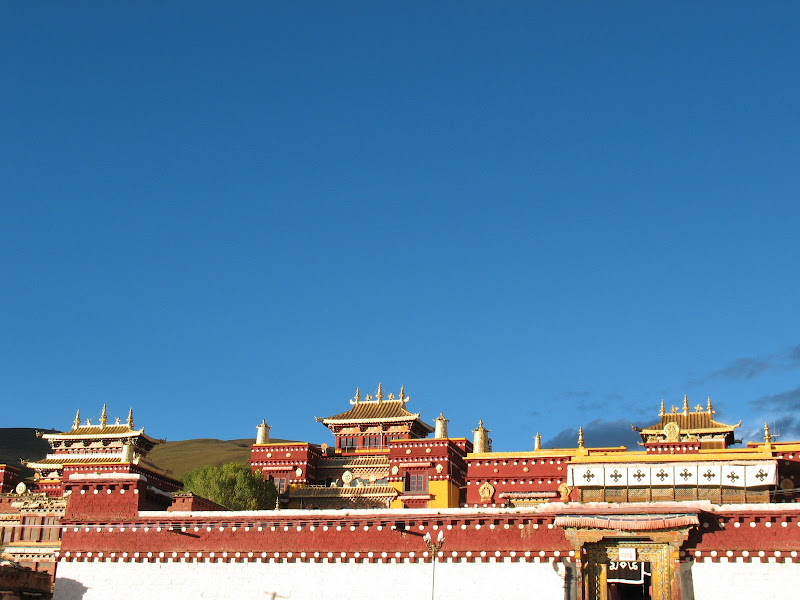 |
| From China |
The ever-present yak population.
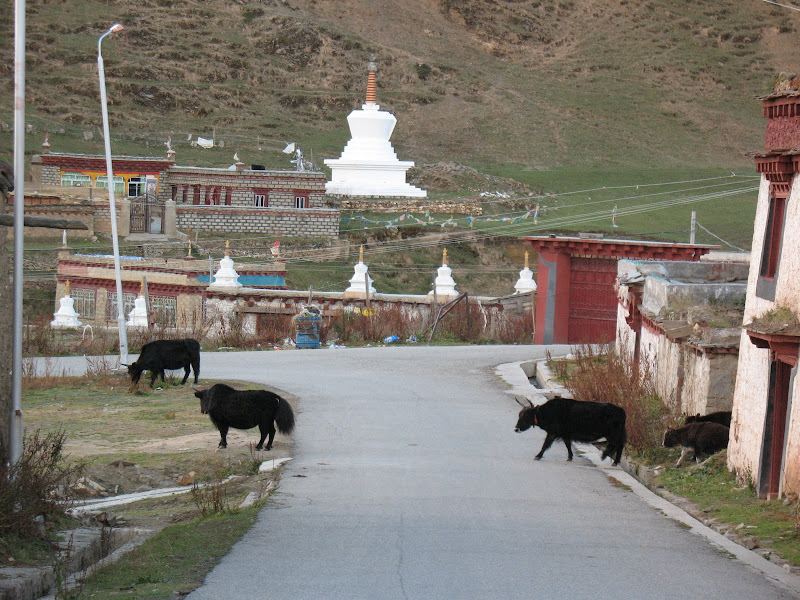 |
| From China |
And the ever-present trash.
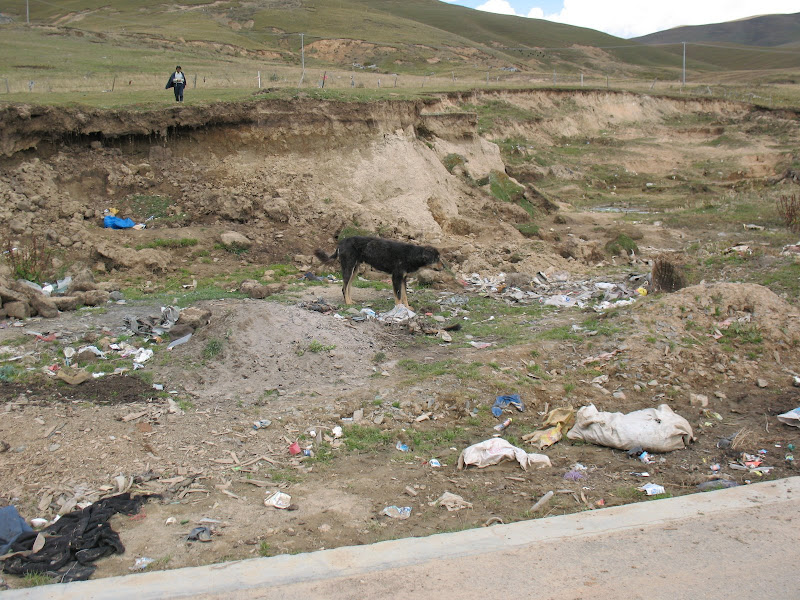 |
| From China |
And the ever-present prayer flags.
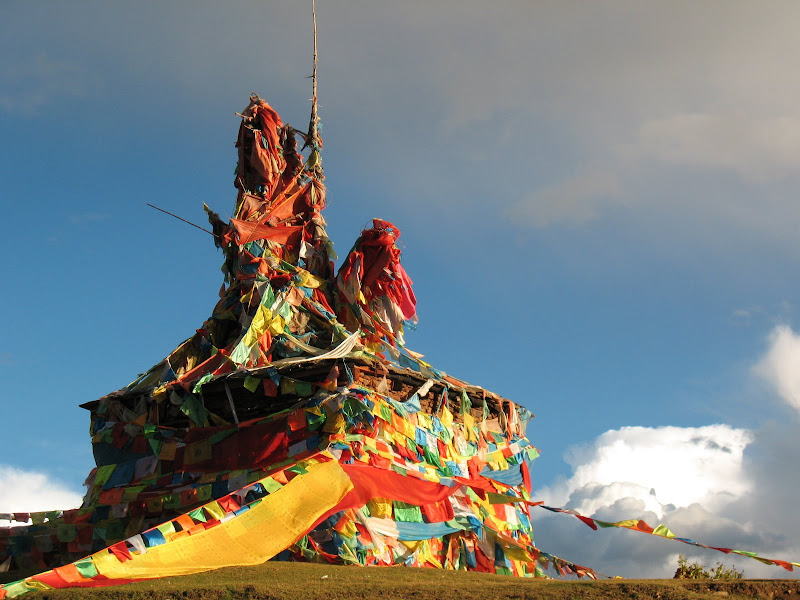 |
| From China |
But it's the people who bring the most character to this town.
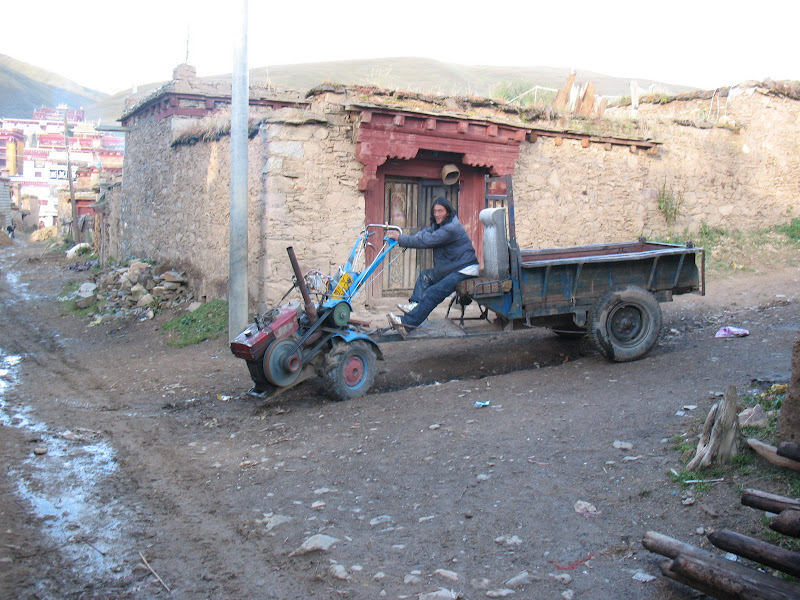 |
| From China |
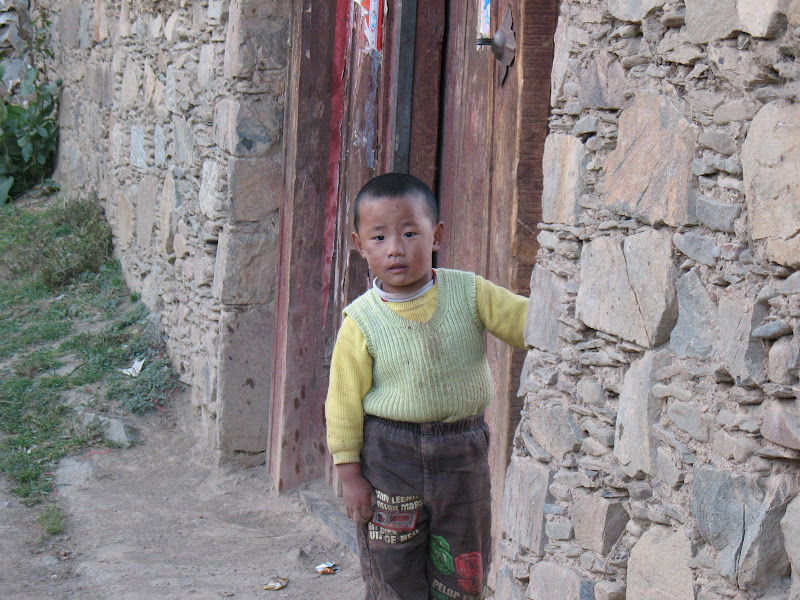 |
| From China |
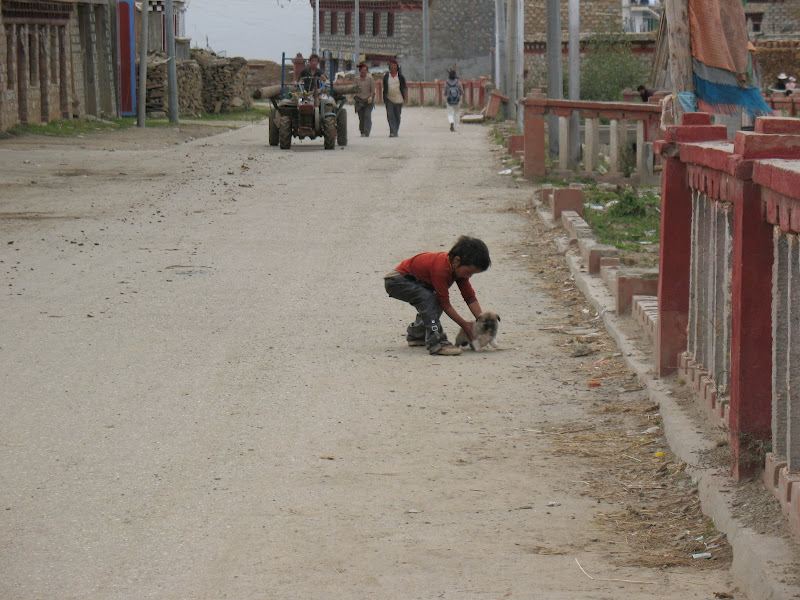 |
| From China |
These two gentlemen invited me to sit with them, despite not speaking a word of English. This was a common occurence--waving you over, Please sit! America? Very good!
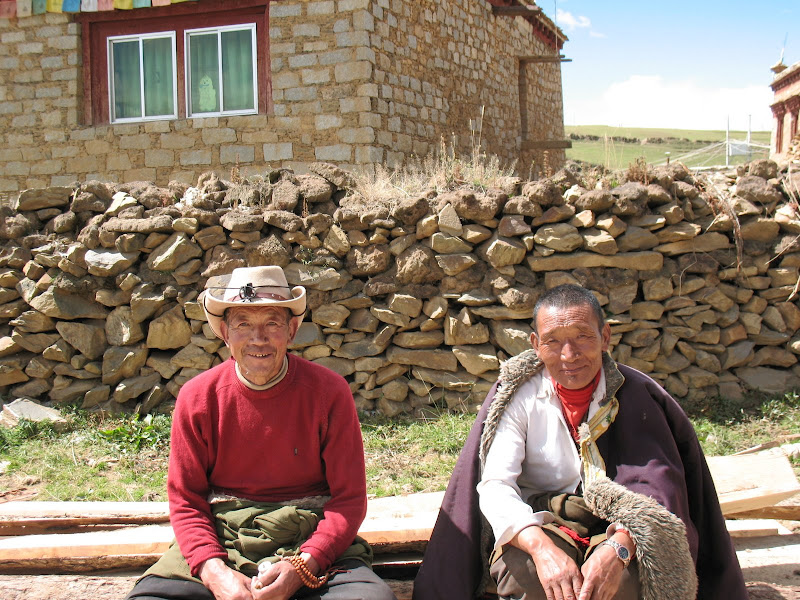 |
| From China |
But one person in particular has a special place in the hearts of foreign visitors to Litang: Mr. Zheng. He owns a local restaurant and is excited to share all he knows about the area with visitors. The walls of his place are full of postcards and photos from those who have passed through, and his guest book is full of messages from around the world. Sim, the adventurous hostel owner who helped me plan this backwater trip, has become good friends with Mr. Zheng and recommends that all visitors stop by during their stay in Litang. In the end, as he usually does, Mr. Zheng found me.
Walking down the street, I hear a hello! which is perfectly common in this town. I turn to return the greeting and recognize Mr. Zheng from the photo is Sim's brochure. I shake his hand and tell him that not only had I met Sim, but he should be passing through Litang sometime soon (with the Lonely Planet writer). I sit down for lunch and a few minutes later, Mr. Zheng hands me his cell phone. "Sim!" he says. Turns out he and Carolyn are due to arrive in Litang that very afternoon. I enjoy dinner with them at the restaurant (compliments of Mr. Zheng) that night and let them know I will try to meet them for breakfast as well.
I'll give you the Cliff's Notes version of the rest of the story:
Oct. 1 is a one-week holiday in China. Lots of Chinese travelers who don't know proper hostel etiquette invade my hostel. Loud partying ensues, plus more vomiting than I've ever seen at one time. Unable to even take a shower the next morning because of incompetent hotel staff, I go to breakfast with Sim and Carolyn and am convinced to skip town that day and head south with them toward Yunnan Province. We spent the night in Xiangcheng and the next day they headed back north, while I went south.
Sim takes a photo of Mr. and Mrs. Zheng in front of their restaurant.
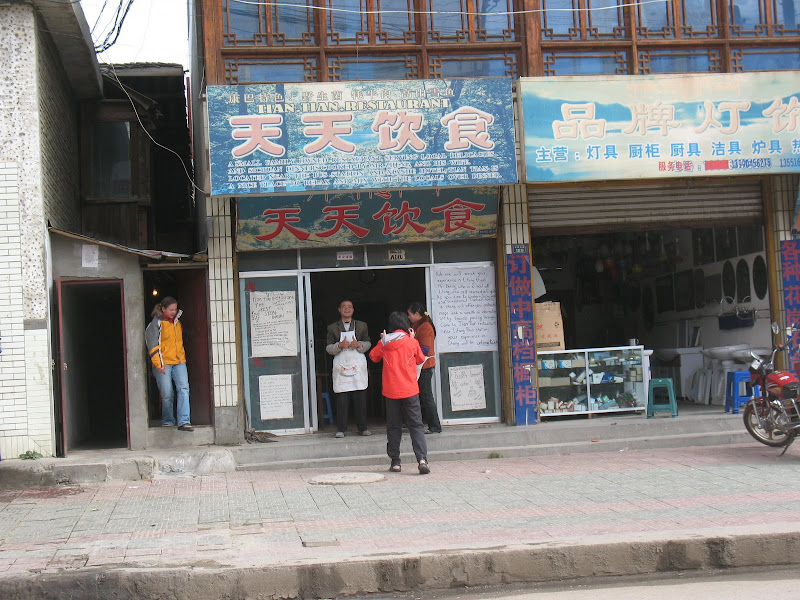 |
| From China |
An ethical decision
Tibetans have a unique way of disposing of bodies when people die. Due to the altitude, there are few trees for burning and the ground is often too hard to dig graves. Sky burial has become the method of choice for many. It's also become somewhat of a morose tourist attraction.
I will leave out the gruesome details, but what happens in the end is the body is devoured by vultures, who take it up to the sky. Mr. Zheng encourages travelers to check out a sky burial, and his guest book has many recommendations from other travelers as well.
In the end I gave it a miss. Not for fear of getting sick at the sight of the mutilated body. But because I simply had no business being there. It's one thing to go to a stranger's funeral. But this, I felt, is a far more personal event; one which a foreigner has no part in.
Subscribe to:
Posts (Atom)


